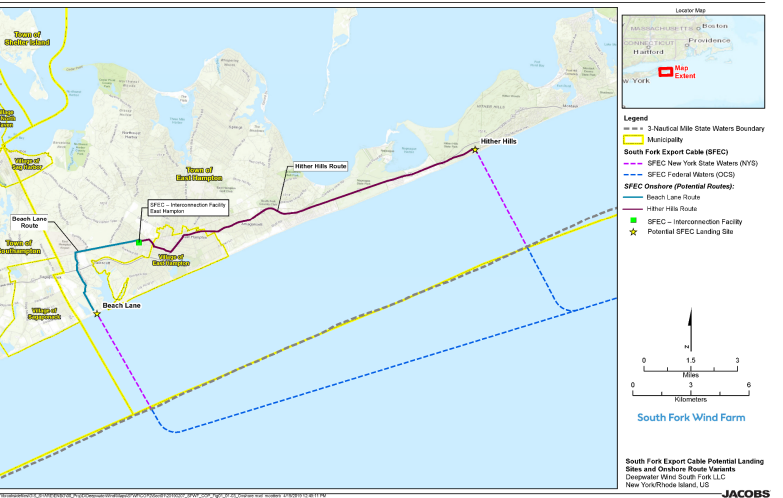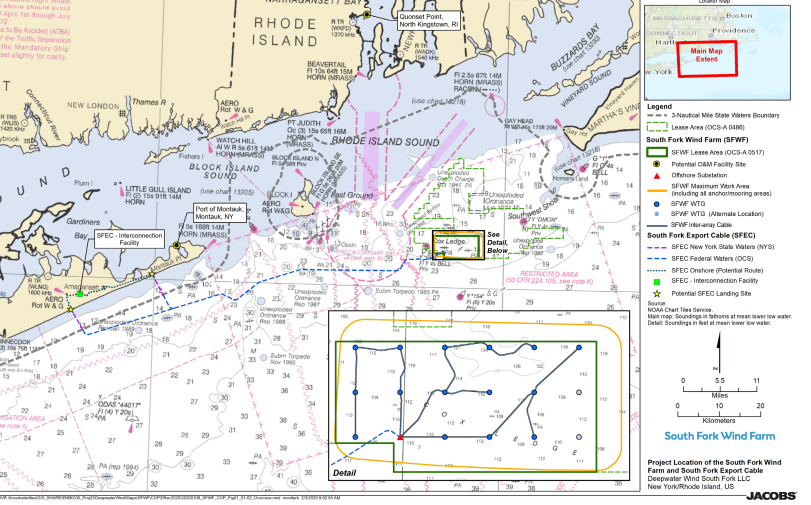Rhode Island fishermen are prepared to sue federal and state agencies and private offshore wind developer Ørsted over an offshore wind farm that would contain 12 turbines just southeast of Block Island called the South Fork Wind Farm.
The attorney representing the Fishermen’s Advisory Board and individual fishermen, Marisa Desautel, sent a legal notice May 10 on behalf of her clients’ intentions to sue Ørsted Offshore North America, Rhode Island Coastal Resources Management Council, Bureau of Ocean Energy Management, and the U.S. Secretary of the Interior. The notice states that the construction process for the 132-megawatt wind farm has not followed the plans.
By breaking the agreed-upon plan, the agencies have violated federal law governing offshore wind development. Fishermen pointed out that Ørsted and co-developer Eversource Energy LLC illegally expanded the no-fishing and no-travel zones while laying cables that will eventually connect the turbines to the mainland electric grid east of Montauk.

The approved construction plan calls for a 500-meter buffer on either side of the cables; however, on April 20, fishermen in the area stated, allegedly, that they were told by the Ørsted vessel that they must stay a mile and a half away from each side of the cable.
The letter of intent, shared with the Rhode Island Current, states, “The restriction in traffic and fishing caused by Orsted also caused fishermen to suffer direct damages in the loss of income from profits from fishing. This loss to fishermen is uncontemplated and questionably compensable under the current framework of the BEOM approval of the current COP.”
Desautel brought this issue to coastal regulators at an April 25 meeting when they considered approving a separate wind farm by the same development team called- Revolution Wind. She argued that Orsted had become less credible by illegally extending a no-fishing boundary on the South Fork Wind Farm.
An attorney representing Ørsted claimed that the allegations were false and that whoever told the local fishermen they had to be more than 500 meters away was not from the developer’s vessel. The council denied the request to postpone their vote.
Desautel has since filed a public records request from the U.S. Coast Guard radio transmissions to confirm the allegations. Though there is no written documentation, the case will still be ongoing. The notice of intent on behalf of the fishermen signals that fishermen will file a civil lawsuit in the U.S. District Court within 60 days and includes a list of demands from the defendants.
Federal agencies have been asked to review the existing plans for the South Fork Wind Farm and require “supplemental mitigation measures” or stop the construction process. Fishermen contested the original analysis based on coastal regulated approval of the project.
Developers and federal agencies of this project already have previous lawsuits from New York residents, a Connecticut solar developer, and others. But still, none of the claims thus far have violated the Outer Continental Shelf Lands Act referred to by the Rhode Island fishing group.







